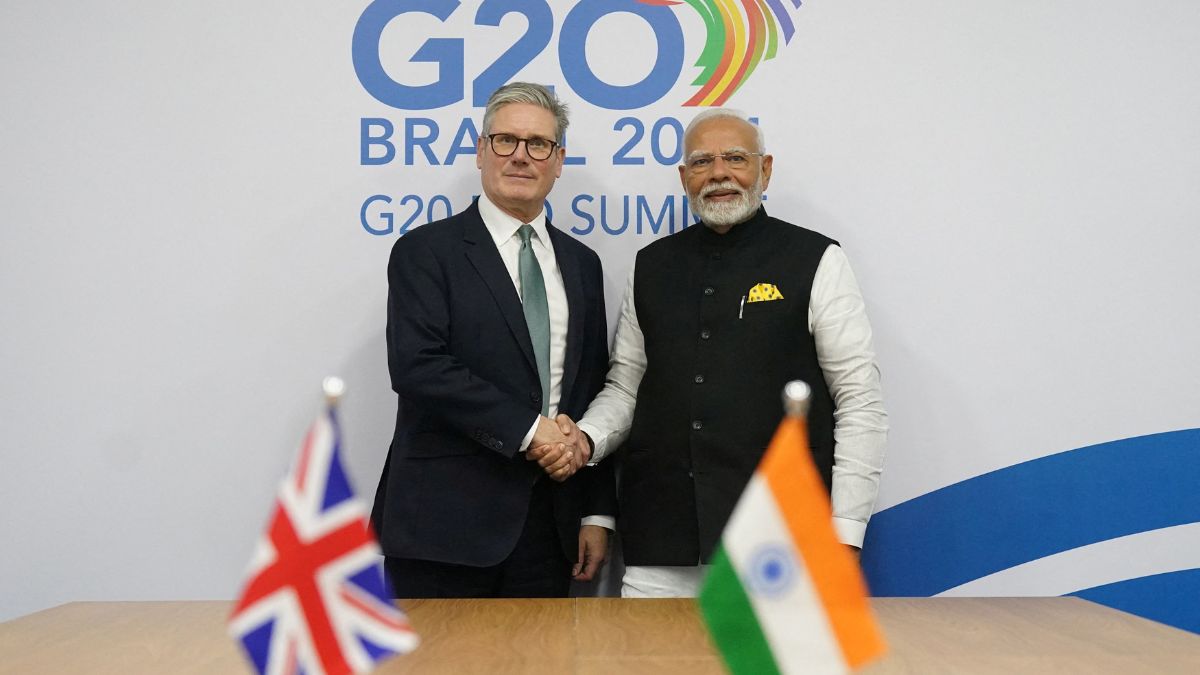Prime Minister Narendra Modi will embark on an official visit to the United Kingdom on Wednesday (July 23). The trip is expected to witness the signing of a bilateral Free Trade Agreement (FTA) between India and the UK.
The two sides had concluded negotiations for the trade agreement on May 6. During his trip, Modi will discuss various issues with British PM Keir Starmer concerning bilateral relations.
From the UK, PM Modi will depart for Maldives for a state visit from July 25-26.
As the Indian leader begins his two-nation tour, here’s what’s on the agenda during the UK visit.
Recent uptick in India-UK ties
The relations between India and the UK have been on the rise in recent years. The Strategic Partnership between the two countries was elevated to Enhanced Partnership for the Future in 2010.
The historical ties have got a boost since Brexit. In 2021, India and the UK upgraded their ties to a Comprehensive Strategic Partnership. They also adopted Roadmap 2030 to boost the relations in trade and investment, defence and security, and people-to-people contact and so on.
In 2023, India and the UK established the 2+2 Foreign and Defence Dialogue. Last year, they launched the Technology Security Initiative.
In May, New Delhi and London concluded talks to reach a bilateral Free Trade Agreement deal, discussions for which first began in January 2022.
Business ties have also enhanced between India and the UK, with goods trade surpassing $23 billion in 2024-25, Indian Express reported, citing data by Indian government sources.
PM Modi in the UK
PM Narendra Modi, who is on his fourth visit to the UK, will hold discussions with his British counterpart Keir Starmer on a range of bilateral issues. “They will also exchange views on issues of regional and global importance,” the Ministry of External Affairs (MEA) said in the official announcement.
The Indian leader is also slated to meet King Charles III.
During the visit, PM Modi will review the state of the Comprehensive Strategic Partnership (CSP), “with a specific focus on trade and economy, technology and innovation, defence and security, climate, health, education and people to people ties,” the MEA said.
PM Modi is also likely to interact with business leaders in the UK.
FTA, Khalistan & more
A key part of PM Modi’s UK visit is the finalisation of the trade agreement between the two countries.
India and the UK are expected to sign the FTA on July 24. “We are working on legal scrubbing and other last-minute work that needs to be done,” Foreign Secretary Vikram Misri told a press conference on Tuesday, ahead of PM Modi’s visit.
The India-UK FTA would eliminate duties on 99 per cent of Indian exports to Britain, including key sectors such as textiles, leather, gems and jewellery and auto parts and engines.
In return, India will reduce or remove tariffs on 90 per cent of British products, including medical devices and alcoholic beverages.
According to British estimates, the India-UK FTA will enhance bilateral trade by £25.5 billion annually by 2040.
PM Modi had announced the trade deal with the UK on May 6, calling it “ambitious and mutually beneficial”. The UK government has described the agreement as “the biggest and most economically significant bilateral trade deal”.
Commerce and Industry Minister Piyush Goyal will accompany PM Modi to London for the signing of the India-UK FTA.
The talks will reportedly feature matters related to security and technology.
India is likely to raise the issue of a surge in Khalistani threat in the UK . “The presence of Khalistani extremists…we have brought to the attention of our partners in the UK. This should be a matter of concern for our partners as well,” Misri told the media.
Modi had flagged the issue to Starmer on the sidelines of the G7 Summit in Canada in June. The two leaders had also interacted during the G20 Summit in Brazil last year.
The extradition of fugitives could also be among the top agendas during PM Modi’s UK visit.
India is seeking the extradition of Lalit Modi, Nirav Modi and Vijay Mallya, who are wanted for financial fraud, from the UK.
“There are a few questions related to fugitives from Indian law and justice in the UK. These have been a matter of discussion between both sides, and we continue to make the case for these fugitives to be rendered to India. Obviously, there is a legal process that such requests and such issues go through in the other country, and we continue to follow up very closely with our partners in the UK on these matters,” the Indian foreign secretary said.
With inputs from agencies
)